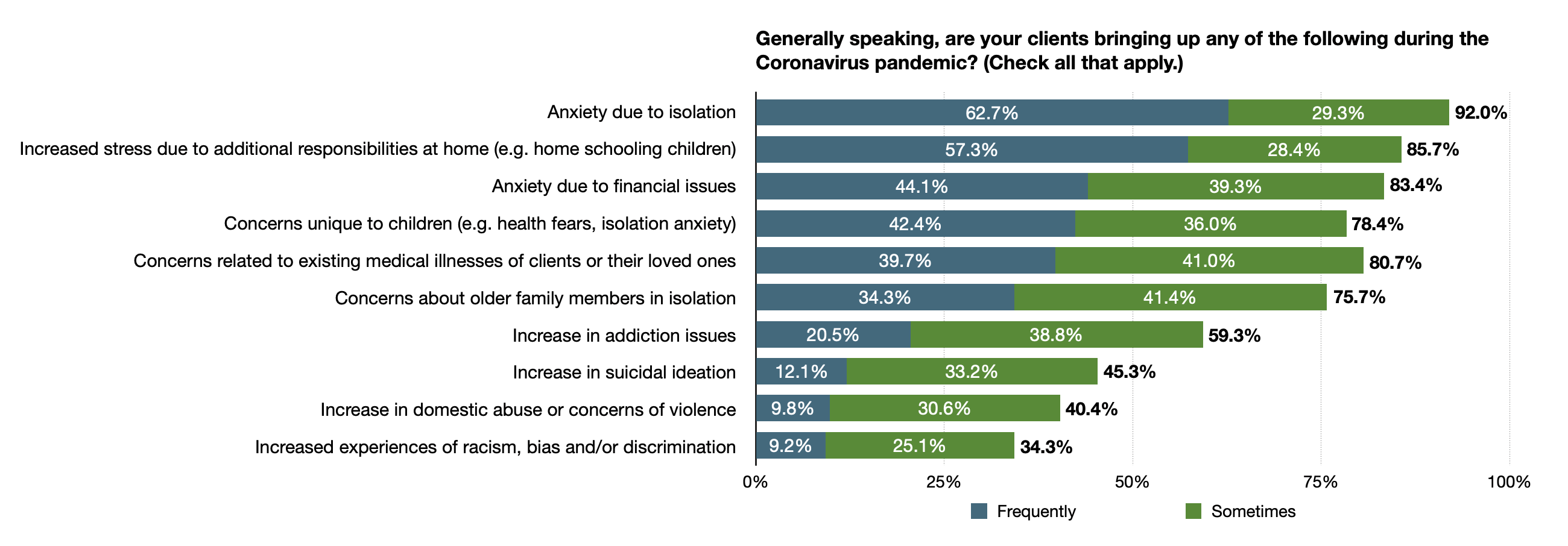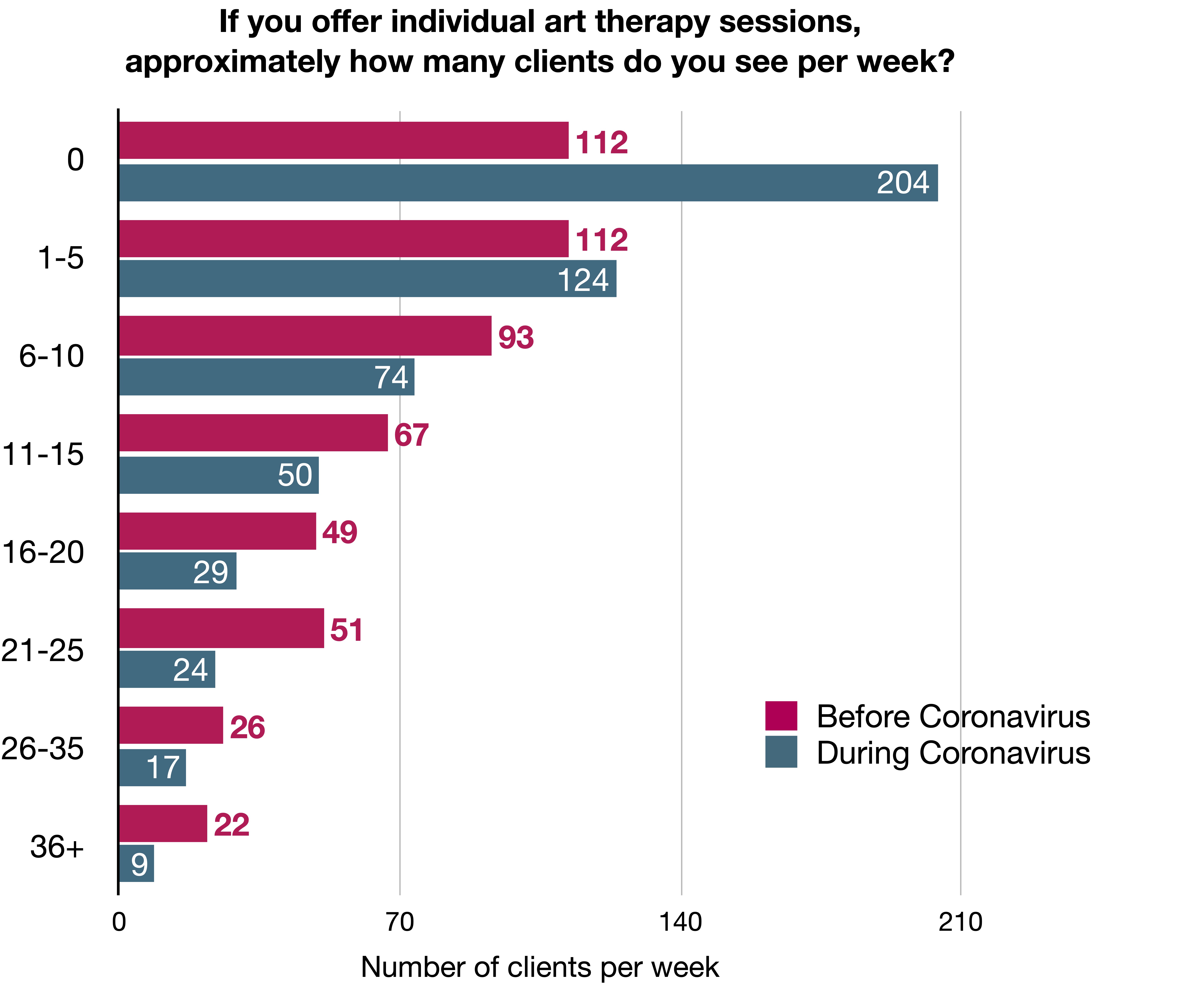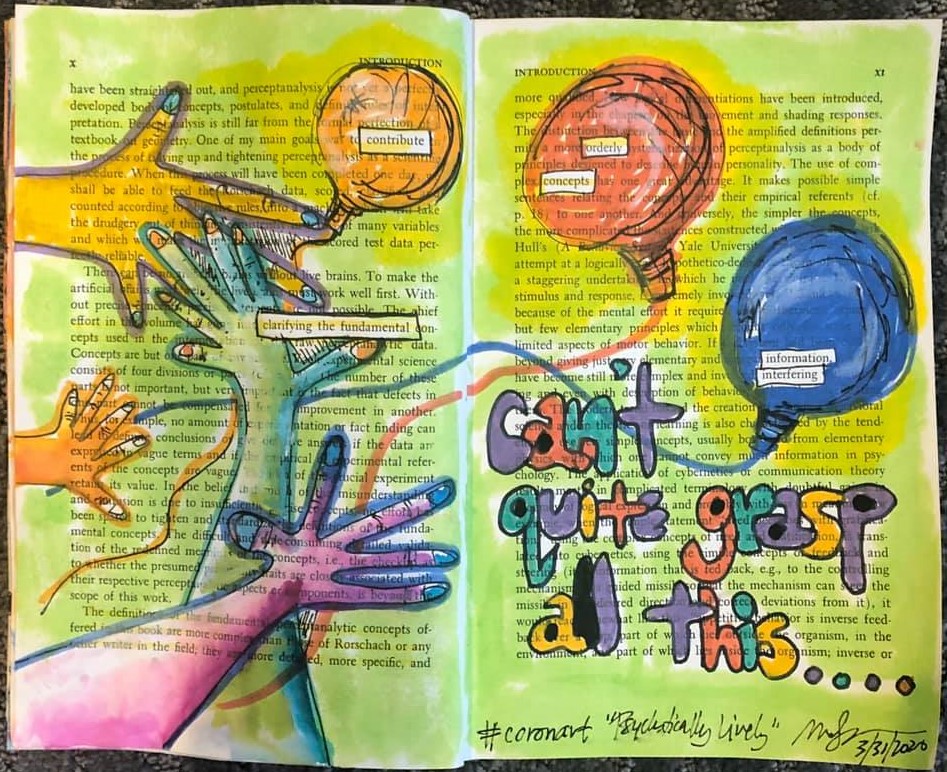August 24, 2020
Art therapists, as mental health professionals, are frontline “essential workers” during the Coronavirus pandemic, according to the American Art Therapy Association’s online Coronavirus pandemic survey. Half (53.1%) of art therapists reported that they are continuing to go to work in person. The survey also found that in order to better respond to the unfolding mental health crisis during social distancing guidances, art therapists have transitioned to teletherapy either partially or entirely. It is also clear from the survey results that our nation is in the middle of a mental health crisis. Overall, access to mental health care has declined as a result of the Coronavirus pandemic, according to the art therapists that took this survey.
While the results of this survey of art therapists capture a particular moment during the Coronavirus pandemic—when 95% of Americans were under some sort of stay-at-home policy—the findings remain relevant as the number of COVID-19 cases continue to rise. We hope that these results will help inform how lawmakers address the ongoing mental health ramifications of the pandemic and better support mental health professionals.
Our nation’s mental health crisis must be addressed.
Art therapists report that access to mental health care has declined as a result of the Coronavirus pandemic. A third (32.2%) said that their clients’ financial situation had changed and they no longer could afford therapy. And nearly a third (30.4%) noted that residential clients (e.g. in hospitals, nursing homes or correctional facilities) no longer have access to therapy.
This reduced access to mental health care is particularly concerning given that art therapists also reported they are more frequently hearing from clients about addiction issues (59.3%), suicidal ideation (45.3%), and domestic abuse or concerns of violence (40.4%). For many struggling with these issues, the isolation has been especially debilitating, and the challenges of teletherapy are amplified due to lack of privacy, internet connectivity, or finances.
However, many art therapists surveyed are hopeful and see the pandemic as an opportunity to heighten awareness of mental health care.
“I have hope that I am doing my part as a AMFT [associate marriage and family therapist] student and that the world will be better off if we prioritize mental health during this time.”
“The Coronavirus and the government reaction has created heightened awareness of societal and systemic problems, including but not limited to mental health.”

Telehealth has been critical to continue care during this pandemic, but has its own challenges, particularly for vulnerable communities.
While technology has made it possible for some people to access mental health care during this pandemic, for others, technology has been a barrier to care. As art therapists have transitioned to teletherapy, half (52.3%) said they are noticing a technology gap. For some clients, technology is causing disruptions in their care, including the lack of internet or difficulties downloading video-conference apps.

Art therapists also said that they are having fewer sessions with clients. The number of art therapists who are not seeing clients (virtual or in person) during the pandemic almost doubled, and the number of clients seen decreased overall. Among art therapists who offered group therapy sessions, nearly half (48.8%) no longer do.
“Overall I think the technology is fantastic and much good has come from this connection. I can see clients who would not otherwise be seen.”
“Clients are living in poverty and have limited access to technology. Clients live with many people in the home and have limited access to private spaces. Clients are young children and do not use their own devices yet. Clients have learning disabilities and struggle with communication over technology.”

Mental health professionals are “essential workers” and need PPE.
Many art therapists, as mental health professionals, are on the front line during this pandemic, with more than half (53.1%) reporting that they are continuing to go to work in person, among them, two thirds were (64.5%) identified as “essential workers” by their employers.
Art therapists, like other frontline workers, are in need of greater access to testing and PPE. One in 13 (7.8%) survey takers believe they had contracted COVID-19. Among those, 2.4% reported being tested. Among art therapists considered “essential workers,” more than a third (37.5%) report that their employers are not adequately implementing social distancing guidelines. In addition to PPE, art therapists are also in need of products and protocol to clean their art supplies. Among art therapists considered “essential workers,” a quarter (26.3%) report that procedures to disinfect art materials at their workplace are not adequate.
“I feel stress and lack of support in a workplace culture of denial. Supervisors are not adequately enforcing staff to wear face coverings, probably due to lack of supply. There has been an OSHA complaint regarding my workplace’s inability to supply adequate masks, gloves, disinfectant to all departments (including nursing.)”
As small business owners, some art therapists are looking for financial relief.
Art therapists as owners of private practices, art studios or other small businesses are struggling like many other businesses. More than a quarter (28.5%) said that they have received or applied for a small business loan through the Paycheck Protection Program (PPP). A third (32.3%) say that they have had to give up their physical office or studio space.
“The Paycheck Protection Program (PPP) gave me only $1600! Could not contest or would have to get back in line and risk getting $0!”
Policies addressing the pandemic must also address underlying racial inequities and bias.
Art therapists surveyed also reported that they are hearing about increased experiences of racism during Coronavirus. One third (34.3%) of art therapists surveyed said their clients brought up increased experiences of racism, bias and/or discrimination, with 9.2% of survey takers saying increased racism was coming up “frequently” during their client sessions.
“There are racial and socioeconomic barriers to care in my city.”
As state governments end restrictions, art therapists are concerned about ensuring public safety.
As the national dialogue has moved to re-opening despite the rising numbers of Coronavirus cases, art therapists are concerned about returning to in-person work, especially due to a shortage of PPE and sanitation equipment needed to clean art supplies. Many art therapists were worried about the public health implications of re-opening without having enough guidelines or equipment.
“As I plan to tentatively re-open in-person sessions, I am struggling to acquire the cleaning supplies and masks necessary to resume.”
623 art therapy professionals, students and educators participated in the online survey in May 2020. Download the complete report: “Art Therapy During A Mental Health Crisis: Coronavirus Pandemic Impact Report.”

“Psychotically Lively” by Mindy Jacobson-Levy, MCAT, ATR-BC, LPC, HLM DVATA/PAATA, art therapist in private practice in PA and NJ. May 31, 2020.
“I created this art rendering after sheltering in place during the first three weeks when COVID-19 erupted. Varying people of all ages and nations reach out for clarification regarding the fundamental elements of the pandemic, while trying to organize all the interfering information. Light bulbs turn into balloons and float away, as there are no answers; the colors used are garish and uncomfortable. The result is I ‘can’t quite grasp this.’ The title, ‘Psychotically Lively,’ reflects our current lives with an insidious disease that overwhelmingly threatens our ability just breathe.”
